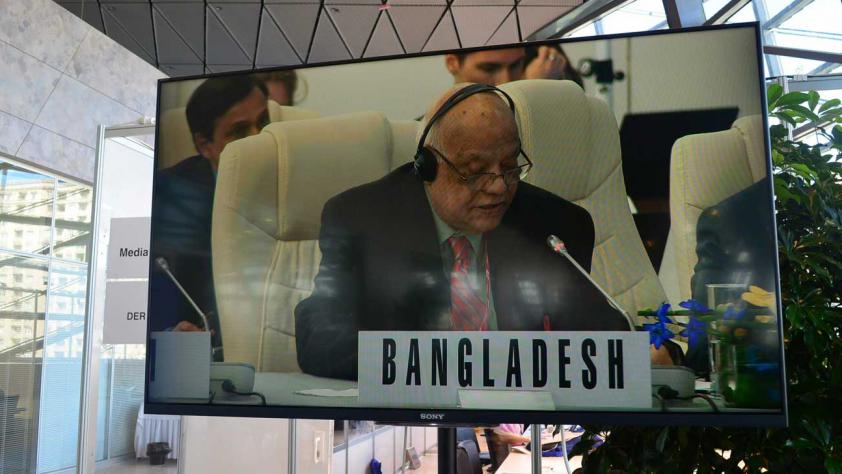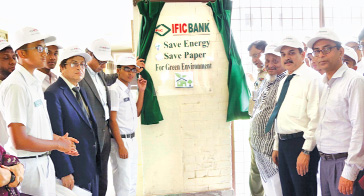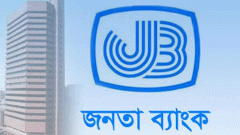Banking
Banks join hands with ADB for infrastructure funds
 Finance Minister AMA Muhith is seen on a screen as he speaks at the Asian Development Bank's annual meeting in Baku, the capital of Azerbaijan, yesterday. Muhith asked the ADB to function more from its field offices than from its headquarters. With a cumulative portfolio of $16.34 billion in loans and grants, the ADB remains a key development partner for Bangladesh, he said.
Finance Minister AMA Muhith is seen on a screen as he speaks at the Asian Development Bank's annual meeting in Baku, the capital of Azerbaijan, yesterday. Muhith asked the ADB to function more from its field offices than from its headquarters. With a cumulative portfolio of $16.34 billion in loans and grants, the ADB remains a key development partner for Bangladesh, he said.
The Asian Development Bank has signed an agreement with eight global banks to work together to advise governments on public-private partnership, a move aimed at accelerating the flow of funds into infrastructure projects in developing Asia.
Bangladesh is among seven Asian countries that ADB has identified as potential areas where 30 projects could be implemented at the cost of $20 billion.
The deal is the first formal co-advisory framework between a multilateral development bank and commercial banks, Ryuichi Kaga, head of ADB's Office of Public-Private Partnership, said at a media briefing yesterday on the sidelines of the lender's annual meetings in Baku, the capital of Azerbaijan.
ADB and the commercial banks will advise the Asian governments on how to best structure the PPP projects, make them attractive to the private sector and manage the bidding process. The governments will, however, make the final choice of PPP winning bidders.
Asia's developing nations need to spend $8 trillion until 2020 on infrastructure projects, mainly on energy, roads, railways, ports, airports and water, to keep up economic growth momentum. Growth in Asia and the Pacific remains strong, as ADB expects the region to maintain a growth rate of 6.3 percent this year.
Infrastructure such as transport, energy and water accounts for about 80 percent of ADB's operations.
Infrastructure is not only the basis for economic and industrial development, but also indispensable for human development, raising standards of living and reducing poverty, ADB President Takehiko Nakao said in a statement.
“The public sector alone cannot bridge the region's huge infrastructure financing gaps. Much larger investments from the private sector are needed. We must use public-private partnerships more effectively,” he said.
The region has a remarkable record of fighting poverty. But as recently as 2011, 544 million people were still living under the traditional poverty threshold of $1.25 a day. Last year, ADB developed a new poverty measure taking into account the consumption basket specific to Asia's poor, food costs that rise faster than the general price levels, and vulnerability to economic shocks and natural disasters. If the new poverty measure is applied, the number of absolute poor rises to 1.4 billion, or about 40 percent of the region's total population. “Such high poverty is unacceptable. Poverty must be defeated decisively, and soon,” Nakao said.
In an effort to eliminate poverty and achieve sustainable development in Asia, ADB found Japan, Canada and Australia as early partners in the PPP initiative.
The three countries are providing a total of $64 million to finance preparatory work for the PPP effort, while ADB will contribute $10 million. The combined outlay may climb up to $150 million, with more partners joining in. “Given their huge infrastructure needs, governments in Asia and the Pacific need more options for funding and operational efficiency in infrastructure projects,” Kaga said.
Although there is keen interest to attract private investment into infrastructure, many countries in the region struggle to prepare, structure and place the projects in the market in line with international best practices, Kaga told reporters. The eight banks that will work closely with the ADB are Bank of Tokyo-Mitsubishi UFJ, BNP Paribas, Crédit Agricole, HSBC, Mizuho Bank, Macquarie Capital, Societe Generale and Sumitomo Mitsui Banking Corporation.
ADB, with its co-advisors, will help clients assess the future income flows of projects, bring international best practices to PPPs, and develop PPP capacity in the region to deliver bankable transactions.
News:The Daily Star/5-May-2015IFIC Bank observes Earth Day
 A signage is being unveiled on Dhaka Residential Model College campus in the city recently, marking the Earth Day. IFIC Bank arranged the event.
A signage is being unveiled on Dhaka Residential Model College campus in the city recently, marking the Earth Day. IFIC Bank arranged the event.
IFIC Bank has recently organised a green event named “Green Generation Next” at Dhaka Residential Model College in the city, marking the Earth Day. The main focus of the event was to create awareness among the new generation about preventing environmental pollution and energy efficient habits in daily life. Noted poet Asad Chowdhury was present at the programme as the chief guest with Principal of Dhaka Residential Model College Brig Gen Md Asaduzzaman Subhani in the chair, says a press release.
News:Daily Sun/5-May-2015
Janata Bank waives loan interest violating rules

Janata Bank has waived interest of more than Tk30 crore in the last two years against some loans, violating the interest waiver rules.
The board of directors of the state-owned bank is waiving the interest on loans at a time while the government trying to recover it’s financial health by injecting more public money as capital support.
The government provided the bank with a fresh fund of Tk814 crore in the year 2013 as the bank was suffering from capital shortfall of Tk1,620 crore.
Moreover, Bangladesh Bank investigation has recently identified the provision shortfall of Tk318 crore during last year.
The board recently decided to waive interest of over Tk10 crore against the loan of BI Industry, debiting income account, which is subject to Bangladesh Bank’s approval, according to the central bank source.
Though Bangladesh Bank has denied extending its consent on this approval as, what it said, the board has the authority to take its own decision in this regard in line with the interest waiver policy of the finance ministry.
According to the interest waiver policy, the board of the bank could waive interest on loan subject to confirm the recovering cost of the fund. The policy does not allow any bank to waive interest on loans deducting income at any means.
Earlier, the bank had waived the interest of Tk8.45 crore against the loan of Goodman Pharmaceuticals in the year 2013 and also interest of Tk12.48 crore against the loan of Dhaka Hatchery.
The interest amount that has already been charged was waived debiting income, which was against the interest waiver policy of the finance ministry.
Meanwhile, Comptroller and Auditor General (CAG) has also raised objection over the move to waive the interest but the bank did not pay heed to it.
In an objection report over the interest waiver issue of Dhaka Hatchery, CAG said, “Bank owes Tk21.58 crore to the client against which mortgage property is worth Tk26.15 crore. As the amount of collateral is more than the debt amount, there is no way to waive interest by simply debiting income.”
Despite the objection, the bank waived the interest lowering the market price of property to Tk18 crore. A bank could charge interests and show in the income statement until the loan account is identified as substandard. Later, the charged interests are taken in the suspense account till the identification of the account as bad loan. After this stage, interest on loan remains to be charged.
According to the accounting norms, the bank could only waive interest from suspense account and the uncharged interest. However, the bank could not waive interest, debiting income by any means.
Though it is not required to get Bangladesh Bank’s approval in case of interest waiver, the board of the bank is trying hard to get formal approval of the authority for waiving interest of BI Industry’s loan in an attempt to put the blame on the shoulder of the central bank if any questions arise in future.
“Letters are being exchanged repeatedly between the two organisations, creating a situation where Bangladesh Bank is trying hard to avoid direct response over the case and the bank is strongly pursuing the central bank for getting its approval,” said a senior executive of Bangladesh Bank.
As contacted, Janata Bank Managing Director admitted the fact that it was not a right move to waive interest, by just debiting the income.
He, however, said the bank waived interest on loans after confirming recovery of the cost of fund. He would not detail anymore.
News:Dhaka Tribine/4-May-2015
Banks to require BB nod to issue prepaid card
Bangladesh Bank is going to make it mandatory for scheduled banks to take prior approval from the BB while issuing prepaid card in a bid to bring financial discipline in the banking sector, officials concerned have told New Age. The banks are now issuing credit and debit cards against the clients’ accounts with them (banks), but the customers do not require a bank account to avail a prepaid card. The clients just have to deposit money with the banks to get such a card. A client is allowed to get a prepaid card of a certain amount of money if he or she deposits the same amount of money with a bank, explains a BB official. The clients usually use prepaid card to purchase products from the different shopping malls which are allowing the banks’ prepaid card, he said. The central bank has now no idea what amount of clients’ money is deposited with the banks against their issued prepaid cards, a BB official told New Age on Monday. Besides, a chain super shop has recently issued prepaid cards to its customers like the banks violating the banking rules. The prepaid card holders of the chain shop are now able to purchase the products from their outlets through using the card. The chain shop is now holding deposited money of the clients by issuing the prepaid card, he said. ‘This is a clear violation of banking rules,’ the official said. The central bank will primarily formulate directives for banks and will later do the same for other institutions, he said. The BB official, however, said the merchants like chain shops were not allowed to issue the prepaid card in line with the banking rules and regulations. The central bank is now considering measures to take action against the chain shop’s issuance of prepaid card, he said. According to BB data, the banks issued 1,02,787 prepaid cards as of September 2014. The central bank official said that the BB would prepare prepaid card issuance guidelines after issuing the circular.
News:New Age/4-Age-2015
BSNL targets Rs 500cr revenue by utilising land bank in FY16
NEW DELHI: State-run BSNL is targeting a revenue of Rs 500 crore in the current financial year by utilising its land bank and monetisation of 75,000 towers, among others.
The telecom operator has set a target of generating Rs 500 crore revenue form utilising land bank, training centre and seven telecom factories as well as monetisation of its 75,000 towers, it said.
The company is planning to enter intra-circle roaming pacts with other operators to monetise its network of over 75,000 base tower stations (BTS) or mobile towers, reports TNN.
According to the sources, BSNL officials gave a presentation to telecom minister Ravi Shankar Prasad recently, which highlighted companys turnaround plan.
BSNL, which has got 82 land parcels, will also be augmenting its GSM mobile capacity in the current fiscal.
The operator is planning about 14,736 2G and 10,914 3G base tower stations in 2015-16. Apart from that it will be integrating its wi-fi hotspot and LTE (4G) with the existing GSM network.
Telecom Minister Prasad had asked BSNL to improve quality of services, especially in border and extremist-affected areas, in a bid to become market leader and win back peoples confidence.
The minister said that the government is committed to revive BSNL and numbers of initiatives are in the pipeline to bring the PSU back to the position of market leader.
Prasad is also undertaking a series of meetings with MPs to make telecom officials directly answerable to Parliamentary representatives so as to have a first-hand account of public sectors performance, problems faced and possible solutions.
Prasad has directed DoT to call five such meetings so that all Members of Parliament are given opportunity to raise issues directly with officials concerned.
BSNLs profits started declining from Rs 10,183 crore in 2004-05 before recording a loss in 2009-10.



